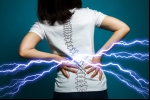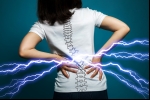Home »
Blog » Back Pain
| Stem Cell, PRP, Acupuncture in Queens & Long Island, New York
Back Pain | Stem Cell, PRP, Acupuncture in Queens & Long Island, New York
Tags: Back Pain | Posted on: 01-May-2020 | No of views: 3954 For everyday causes of lower back pain, standard at-home pain management is a reasonable approach. In fact, most cases of lower back pain are caused by a muscle strain and will get better relatively quickly and do not require treatment from a medical professional. If pain has lasted longer than one to two weeks or begins to interfere with one’s mobility and daily activities, or if there are troubling symptoms, seeking care from a medical professional is recommended.
Read more
Tags: Back Pain | Posted on: 17-Apr-2020 | No of views: 3512 Acupuncture is widely understood to be a non-traditional (not a traditional part of western medicine) treatment option for back pain or neck pain. While acupuncture is often not the first line of treatment sought for most back or neck problems, an increasing number of patients, as well as physicians and other health professionals are starting to use acupuncture as a means to reduce neck pain and back pain. Acupuncture is a form of Chinese medicine that can be traced back to at least 2,500 years. The general premise of acupuncture is that the body contains patterns of energy flow. The vital energy or life force of the body is referred to as qi (pronounced "chee"), and the proper flow of qi is considered to be necessary to maintain health.
Read more
Tags: Back Pain | Posted on: 27-Mar-2020 | No of views: 12091 During this time as we have the Coronavirus Pandemic spread all around the world, stress and stress relief is a major cause for worry for people of all ages and walks of life. For this reason, looking for solutions for the problem is one of the most talked-about issues today. Cupping therapy is a potentially safe, non-invasive treatment that can help you release the stress and avoid the potential medical and psychological ailments that accompany stress. But, why is cupping effective? And, how can it help you? Read ahead to understand the therapy.
Read more
Tags: Back Pain | Posted on: 13-Mar-2020 | No of views: 3653 Lower back pain makes it hard to fall asleep, and it can startle you awake at any hour of the night. To help you reclaim your sleep schedule, here is a simple guide to sleeping with lower back pain: Sleep on your side to relieve pain from a pulled back muscle - One of the most common causes of lower back pain is a pulled back muscle, which occurs when a muscle in your lower back is strained or torn as a result of being over-stretched. Symptoms from a pulled back muscle typically resolve within a few days, but the intense pain can make it difficult to fall asleep at night. Worse yet, the longer you lie in the bed, the more deconditioned your body gets and the worse your symptoms may become.
Read more
Tags: Back Pain | Posted on: 09-Mar-2020 | No of views: 5213 Myofascial pain syndrome (MPS) is a fancy way to describe muscle pain. It refers to pain and inflammation in the body's soft tissues. MPS is a chronic condition that affects the fascia (the connective tissue that covers the muscles). It may involve either a single muscle or a muscle group. In some cases, the area where a person experiences the pain may not be where the myofascial pain generator is located. Experts believe that the actual site of the injury or the strain prompts the development of a trigger point that, in turn, causes pain in other areas. This situation is known as referred pain.
Read more
Tags: Back Pain | Posted on: 07-Mar-2020 | No of views: 3882 Nerve Pain Caused by A Spinal Problem - If you’re like most people, you might be surprised to learn that the nerve pain in your foot may be caused by a problem in an area as far away as your lumbar spine (lower back). This type of foot pain occurs when an underlying medical problem related to your lumbar spine provokes sciatica symptoms along the large sciatic nerve in your leg. In turn, these painful symptoms may travel all the way down the nerve into your foot.
Read more
Tags: Back Pain | Posted on: 02-Mar-2020 | No of views: 5703 What Causes Musculoskeletal Pain? - The causes of musculoskeletal pain are varied. Muscle tissue can be damaged with the wear and tear of daily activities. Trauma to an area (jerking movements, auto accidents, falls, fractures, sprains, dislocations, and direct blows to the muscle) also can cause musculoskeletal pain. Other causes of pain include postural strain, repetitive movements, overuse, and prolonged immobilization. Changes in posture or poor body mechanics may bring about spinal alignment problems and muscle shortening, therefore causing other muscles to be misused and become painful.
Read more
Tags: Back Pain | Posted on: 29-Feb-2020 | No of views: 4446 Herniated discs can cause a variety of different symptoms, but those symptoms can vary depending on where the disc herniation occurs in your spine. Below, we take a closer look at the symptoms of herniated discs based on where they develop in your back. For those of you unfamiliar with the sections of your spine, it can be broken down into three segments: The cervical, thoracic and lumbar portions of your spine.
Cervical. The cervical portion of your spine involves the first seven vertebrae at the top of your spine near your neck.
Thoracic. Below the cervical spine is the thoracic portion of your spine, which is home to the next 12 vertebrae.
Lumbar. Underneath the thoracic spine sits the lumbar portion of your spine, which involves the next five vertebrae.
Read more
Tags: Back Pain | Posted on: 21-Feb-2020 | No of views: 3540 Nobody wants to go undergo an operation, especially if that surgery involves an intricate structure, like your spine. Although some conditions are best treated with a surgical operation, the vast majority will respond to preventative measures and conservative care. So if you want to avoid an operation on your spine, consider these five tips.
Avoiding Spine Surgery - Always listen to your physician’s specific advice when it comes to your exact condition, but these five tips can help keep back pain at bay and keep you off the operating table.
Read more
Tags: Back Pain | Posted on: 14-Feb-2020 | No of views: 6370 If you have an issue with one or more of your spinal discs, you’ve likely heard the term “slipped disc.” This term is sometimes used interchangeably with a bulging disc and herniated disc, but there is no consensus in regards to its precise definition. To help clear things up, let’s look at how the term “slipped disc” may be used when it comes to problems with your spinal discs.
Read more
Love this Post? Spread the World






















